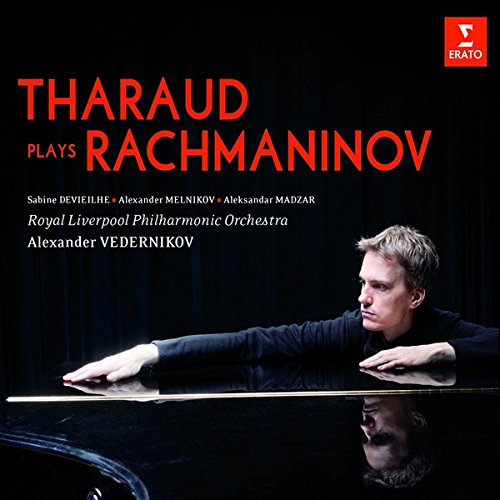RACHMANINOV Piano Concerto No 2
View record and artist detailsRecord and Artist Details
Composer or Director: Sergey Rachmaninov
Genre:
Orchestral
Label: Erato
Magazine Review Date: 10/2016
Media Format: CD or Download
Media Runtime: 67
Mastering:
DDD
Catalogue Number: 9029 59436-9

Tracks:
| Composition | Artist Credit |
|---|---|
| Concerto for Piano and Orchestra No. 2 |
Sergey Rachmaninov, Composer
Alexander Vedernikov, Conductor Alexandre Tharaud, Piano Royal Liverpool Philharmonic Orchestra Sergey Rachmaninov, Composer |
| (5) Morceaux de fantaisie |
Sergey Rachmaninov, Composer
Alexandre Tharaud, Piano Sergey Rachmaninov, Composer |
| (14) Songs, Movement: No. 14, Vocalise (wordless: rev 1915) |
Sergey Rachmaninov, Composer
Alexandre Tharaud, Piano Sabine Devieilhe, Soprano Sergey Rachmaninov, Composer |
| (2) Pieces |
Sergey Rachmaninov, Composer
Aleksandar Madzar, Piano Alexandre Tharaud, Piano Sergey Rachmaninov, Composer |
Author: Jeremy Nicholas
So it proves. After the famous introductory bars – following the score rather than the composer’s recording – the sweeping first subject enters faster, thankfully, than Richter’s celebrated account but with the same majestic assurance. Various boxes are ticked as the movement proceeds, including a properly swaggering alla marcia, emphasised by the piano’s forward placement in the sound picture. The clarinet solo in the Adagio is as tender and vulnerable as you’ll ever hear (with or without its association with Brief Encounter, this one is particularly poignant), and so to the finale, notable for the soloist’s exemplary clarity and the orchestra’s alternately lusty and sensitive playing. On the last page, Tharaud and Vedernikov decide to share the battle honours and storm home as equal partners to thrilling effect.
The concerto is followed not by another but by the five early Morceaux de fantaisie (1892), the second of which is the ubiquitous Prelude in C sharp minor (or ‘It’, as the composer came to call it). If you think you never want to hear the piece again, then listen to this account, a miracle of musical storytelling, a pessimistic interlude between the lovelorn beauty of the ‘Elégie’ (No 1) and ‘Mélodie’ (No 3). The opening of ‘Polichinelle’ (No 4) struck me for the first time as a near-quote from ‘Kangaroos’ in Carnival of the Animals.
As a further contrast, soprano Sabine Devieilhe joins Tharaud in the ‘Vocalise’ (lovely but without quite the same poise as Natalie Dessay or the incomparable Anna Moffo). The disc ends with two more pianists joining Tharaud for the Two Pieces for Piano, Six Hands (1890 91): not Rachmaninov at his best, it doesn’t work as a piece of programming and is thus the only part of the disc that is not completely successful.
Discover the world's largest classical music catalogue with Presto Music.

Gramophone Digital Club
- Digital Edition
- Digital Archive
- Reviews Database
- Full website access
From £8.75 / month
Subscribe
Gramophone Full Club
- Print Edition
- Digital Edition
- Digital Archive
- Reviews Database
- Full website access
From £11.00 / month
Subscribe
If you are a library, university or other organisation that would be interested in an institutional subscription to Gramophone please click here for further information.




